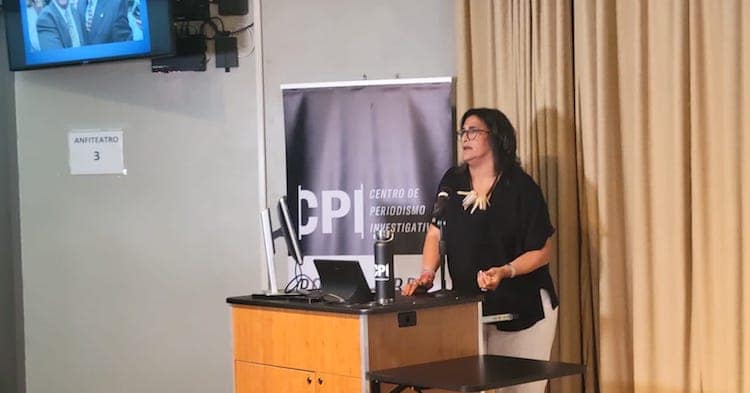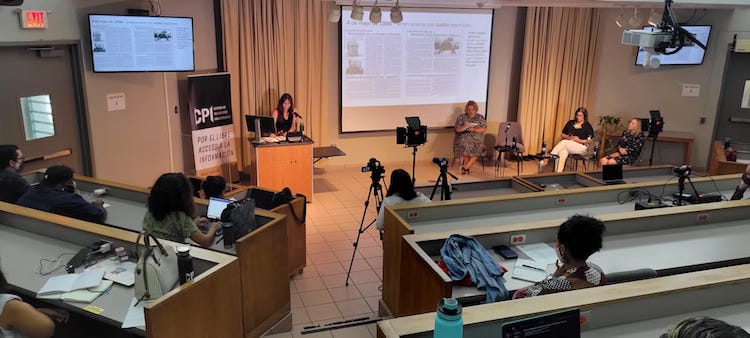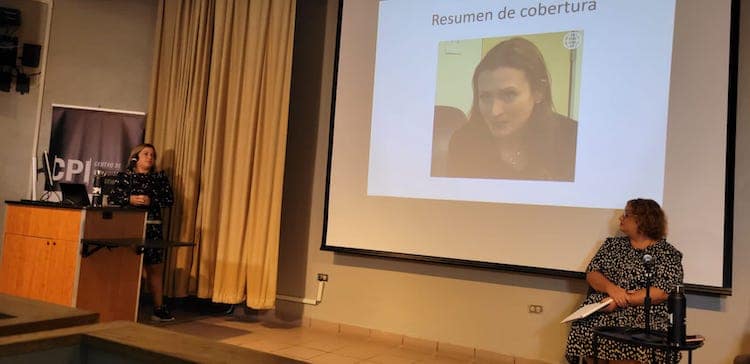“The best investigation is the one that is done without hurry, and that when published, has consequences,” said journalist Carmen Enid Acevedo during a conference entitled “Journalistic investigations of Corruption in the Department of Education,” recalling her experience as a reporter covering the corruption case in that agency when Víctor Fajardo was the Secretary. In 2001, Acevedo had access to prosecution evidence that Fajardo was the leader of a scheme in the New Progressive Party (PNP, in Spanish) to solicit bribes from agency contractors that would go to subsidize the 1996 electoral campaign.

Photo by Ricardo Rodríguez | Center for Investigative Journalism
The audience, comprised by members of the Center for Investigative Journalism’s (CPI, in Spanish) Institute for Journalism Training, heard presentations by Acevedo, Aiola Virella and Marisol Seda, journalists who have investigated corruption-related matters within Puerto Rico’s Department of Education, and reflected on the lessons learned from these investigations.
The panel focused on the corruption cases brought against former Education Secretaries Víctor Fajardo and Julia Keleher. The former, who held the position under former Gov. Pedro Roselló’s tenure, served 13 years in prison for appropriating $4.3 million in federal funds that should have been destined for the education of the island’s children. Keleher, who was part of Ricardo Roselló’s (Pedro Rossello´s son) cabinet, is being tried on charges of conspiracy, wire fraud and bribery, is awaiting the sentencing hearing.
The workshop, moderated by CPI Executive Director Carla Minet, took a behind-the-scenes look at the investigations into both cases.

Photo by Ricardo Rodríguez | Center for Investigative Journalism
Follow your gut
Marisol Seda went to cover a press conference in 1998 in which school cafeteria workers denounced that the menu would be changing from local “criollo” food to pizzas or burritos. But the story didn’t end there. The journalist asked about the contract awarded to the company that would provide the new food services. The owner, Joaquín Arbona Lago, was also the founder of the “Empresarios con Rosselló” group.
This group included executives who, because of their commitment to the PNP, expected to be favored with government contracts once the party won the elections. The investigation was thorough and spanned several years. The contract figures were analyzed considering the number of ounces per can and cans per box.
The work included reporting on the hiring of private bodyguards for Fajardo and his family, paid with public funds, even though no threats had been reported to the Police. The process, Seda explained, included internal negotiations with her editor at El Vocero, Gaspar Roca, to be given time to investigate — one month — and resources with accounting expertise to understand the contracts she was reading. Years later, the Secretary of Education was arrested.
Acevedo also worked closely on the Fajardo case, following the accusations. In her reports, she focused on the relationships between the convict and the party in which he was a member, establishing that his role as political leader of the PNP took precedence over his duties as Secretary. She underscored the contradiction of people within the teaching profession, who when asked about Fajardo, many touted him as the best secretary the agency had ever had, because he was a superintendent of schools and knew the operation of the department from within.
Acevedo assures that it was during Fajardo’s tenure that the school dynamic, which had been tied to community participation in the educational process, began to change and was centralized, taking autonomy away from schools and districts.
The case of Julia Keleher happened within the framework of a multi-million-dollar allocation, this time in recovery funds after Hurricane María struck in 2017. Aiola Virella, editor of the Metro newspaper, spoke about how they got an anonymous tip in the newsroom pointing to some of the acts of corruption that later led to the Secretary’s accusation and guilty plea. The newspaper’s reporters investigated the case and got confirmations and documents that supported the source’s accusations. In her presentation, Virella pointed to several issues indicating that “something strange” was going on.
The lack of transparency in financial matters — like an anonymous donor paying Keleher’s assistant’s salary — the intention of profiting excessively from public funds, earning a $250,000 annual salary, unprecedented in Education, while asking that it be $500,000; and her allegation that she did not remember who had introduced her to the contractor that landed $17 million for the “Tus valores cuentan” program.

Photo by Ricardo Rodríguez | Center for Investigative Journalism
The review of the investigative work that led to the publication of these stories was a master class by the three veterans of Puerto Rican journalism. The journalists agreed to list the challenges to doing investigative journalism in daily media, including obstacles such as lack of time or resources to investigate and the internal censorship they faced from some editors.
They also went over the importance of giving context to the stories, the legwork going to the places that are talked about in the reports and establishing organization charts or maps of the relationships of the characters in the stories.
The Institute for Journalism Training, founded in 2015, is dedicated to training journalists in investigative techniques. The Institute’s events are open exclusively to its members. Enrollment, which costs $20 a year, is open to journalists and journalism students.



